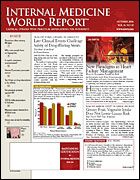Publication
Article
Internal Medicine World Report
HRT Increases Risk for Cerebrovascular Events by 34%
Author(s):
Questions about the use of hormone therapy in older women linger as physicians and women struggle to sort through all the data. Now new data show that postmenopausal women who use hormone replacement therapy (HRT) are at a 34% greater risk of a first transient ischemic attack (TIA) or stroke compared with their peers who do not use HRT (Menopause. 2006; 13:730-736).
Observational studies have yielded conflicting results on the relationship between HRT and stroke, while most randomized controlled trials have associated HRT use with greater risk for stroke. But until now, little information was available on the risk by stroke subtype or by HRT type and route of administration.
This population-based nested case-control study included 158,031 healthy women aged 50 to 69 years who were registered in the UK General Practice Research Data-base between 1991 and 1997, along with 10,000 controls. Patients with a history of cardiovascular or other chronic disease (but not with hypertension) were excluded from the study.
During the 6 years of follow-up, a total of 920 cases of cerebrovascular accidents were confirmed, which included 536 TIAs, 259 ischemic strokes, and 125 events of hemorrhagic stroke.
The overall incidence rate of cerebrovascular events was 1.3 cases per 1000 person-years.
After controlling for factors such as age, smoking history, obesity, diabetes, and medication use, current users of HRT were at a 34% greater risk for a cerebrovascular event than nonusers (Table).
The risk was similarly greater among HRT users with and without a history of hypertension (odds ratio, 1.29 vs 1.36, respectively) compared with nonusers.
When broken down by specific events, current HRT users were at an increased, dose-dependent risk of TIA, especially during the first year of use. And although only a small number of participants used transdermal HRT, these women appeared to be at lower risk for an event than those who using oral preparations (odds ratio, 0.86 vs 1.47).
The association between current HRT use and increased risk for cerebrovascular event “was more apparent for TIA, which represented more than one half of our cases,” write lead investigator Alejandro Arana, MD, and colleagues.
The effects of HRT on hemostasis are still uncertain, but the authors speculate that the net effects on coagulation and fibrinolysis may be related to the type, dose, and duration of therapy.






